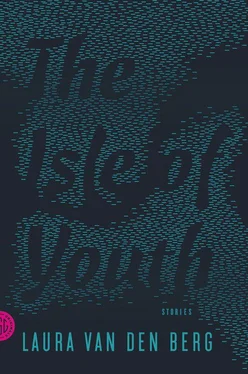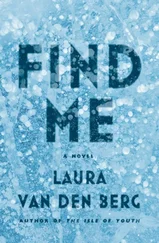Mrs. Defonte was playing Donna Anna and the masked man was Don Giovanni. She wore a floor-length gown with lace sleeves and green brocade, the veil still clipped in her black hair. Her voice was as beautiful as ever. I wondered how much she thought about her husband, what she thought about him. I imagined she had theories of her own.
Don Giovanni wore black pants, a white peasant shirt, and a wig. The basic problem in the story was that everyone wanted Don Giovanni to change, but he wouldn’t. It also showed how a person’s actions come back on him, how the seed of what happens next exists in what’s happening now. I had started going to the rehearsals because of Mrs. Defonte, but in the end, Don Giovanni was the one who held my interest.
My favorite scene was set in a graveyard. Don Giovanni and the servant, Leporello, were surrounded by gravestones. Giovanni’s laugh summoned the ghost of the Commendatore, who he’d killed in act one. Leporello was frightened; Giovanni invited the Commendatore to dinner. He couldn’t know, couldn’t see, what would happen next.
It was a terrible flaw, our inability to see where our lives were leading us. For instance, in the back row of the theater, I could never have imagined that in late August, while Julia was stopped at a red light in Opa-locka, three blocks from our apartment, a man would walk up to her and shoot her in the head. She died at the scene. Our mother had to fly back from Muscat, her neck heavy with blue topaz, which, she had been told, would shield her from grief. I couldn’t have imagined how long I would stay in Julia’s apartment, out of a strange sense of loyalty, before I broke down and moved to Coconut Grove and took a job as an administrative assistant in a law firm, perhaps not so unlike the one Mr. Defonte had worked in. I couldn’t have imagined that, after my father pled out and was sentenced to fifteen years, I would have flown all the way to Nevada to see him in jail, to tell him that his daughter was dead and our mother might as well be, to tell him that I missed him, that I would never forgive him, that he could fuck his fucking postcards, and not be able to get past the entrance. In fact, I couldn’t even get out of the rental car. I sat in the parking lot for hours, blasting the Kingsmen CD I’d brought along, the postcards tucked into the glove compartment, before driving away. For the first ten miles I convinced myself that I was doing preliminary surveillance, that I would be back. I wondered if my husband would be consoled by the fact that the lies I told him were nothing compared with the ones I sometimes told myself. No, none of that seemed possible, as I watched Mrs. Defonte and Don Giovanni sing in a way that made my insides tremble.
The Commendatore came back to Don Giovanni in the form of a statue. The singer was painted silver and wore a helmet and a cape made of chain mail; he reminded me of the Tin Man from The Wizard of Oz . Even after I’d seen the whole opera, I kept willing Don Giovanni to not laugh in the graveyard, to not invite the Commendatore to dinner. Run away , I would whisper in the back row. Just run away. He never did, of course, and it wouldn’t have changed anything if he had.
1.
There are four of them.
Dana, Jackie, Pinky, and Cora are cousins. Pinky is also Dana’s little brother. They call themselves the Gorillas because all gangs need a name — see Hole-in-the-Wall Gang, Stopwatch Gang, Winter Hill Gang — and also because they wear gorilla masks during their holdups. They are criminals, but they still have rules: no hostages, small scores, never stay in one town for more than a week. It’s late summer and they’re roving through the Midwest, from motel to motel, making just enough to keep going. Dana watches the impossibly flat landscapes of Lafayette and Oneida pass through the car window and wonders how they all ended up here. Why didn’t they go to school and get regular jobs and get married and live in houses? The short answer: they are a group of people committed to making life as hard as possible.
Cora says they need to think bigger. No more knocking over delis and drugstores and dinky banks. They need to do a real heist. There are millions to be made, if they could just grow some balls. Jackie has simpler desires. She wants a boyfriend and a set of acrylic nails. Pinky is thirteen and wants to build a robot. Dana is more about what she doesn’t want, as in: she doesn’t want anyone to go to jail or die.
In L.A., a gang of female bank robbers have been making headlines. They wear Snow White masks and carry semiautomatics. Witnesses have reported them doing tricks with their guns during heists. They’re rumored to be retired Romanian acrobats. Naturally, the press loves them. They’ve been nicknamed the Go-Go Girls.
“Why aren’t we ever on TV?” Cora complains one night. They’re in a motel in Galesburg. They have plans for the Farmers & Mechanics Bank on Main Street. Dana lies on one of the musty twin beds; her cousins are curled up on the other. Cora is green-eyed and lean with cropped auburn hair, like Mia Farrow in Rosemary’s Baby. Jackie is shaped like a lemon drop. Her dark, wide-set eyes remind Dana of a well-meaning cow. Pinky is working on his robot in the bathroom. He’s been collecting materials from gas station and motel Dumpsters: pins, wires, batteries, little black wheels. Earlier, Dana stood in the doorway and watched him screw two metal panels together. He sat cross-legged on the floor, his lips puckered with concentration. The overhead light flickered and buzzed. The spaces between the shower tiles were dark. She’d never seen him work so hard on anything before.
“Those are the kind of people who end up in shoot-outs with the police,” Dana tells Cora. The Go-Go Girls have just stolen two million in diamonds from a bank in Beverly Hills. Dana picks up the remote and changes the channel to a cooking show. A woman is finishing a dessert with a blowtorch. Dana closes her eyes and listens to Pinky rattle around in the bathroom. Did they want a shoot-out with the police? She considers the Dalton Gang and John Dillinger. Is that what they want, to bleed to death on the street? The room is hot. The smell of burning rubber wafts through the bathroom door. No, she decides. No, it is not.
There is a river in Elijah, Missouri, that always appears in her dreams. They all grew up in Elijah. In this river they learned to float. Dana would stare up at the clouds and imagine they were spaceships or trains. In this river they would dive and search the bottom for smooth, flat stones. In real life it’s a slender, slow-moving river, but in her dreams it’s as wide as the Mississippi and silver, as though it’s made of melted-down coins. From the shore she sees a raft with no one on it. She wants to get on the raft, but doesn’t know how.
That night she wakes sweaty and breathless. She sits up. Pinky is next to her, asleep on top of the covers. He’s rangy and sharp-elbowed. His arms are folded under his head. His mouth is pink and sticky from chewing red hots. She touches his pale hair — towheaded, her father used to say — and feels heat rising from his scalp. Outside, she hears rain falling. She lies back down. She tells herself to go to sleep. She tells herself to stop dreaming.
In the morning, they case the Farmers & Mechanics Bank. They drive around the block twice in their Impala and then park at the pizza place across the street. To their left is a small roundabout with a patch of green and two withered trees in the center. It’s called Central Park, which makes Dana think of the real Central Park in New York City, a place she will probably never see. A truck rattles past. The exhaust pops and Dana twitches in her seat. Cora is driving. Dana is sitting next to her. Jackie and Pinky are in the back and of course her brother is trying to wind two wires together. Dana imagines that when the Go-Go Girls case, it’s all high-tech, with thermal imaging binoculars and fancy cameras. They just have their eyes.
Читать дальше












